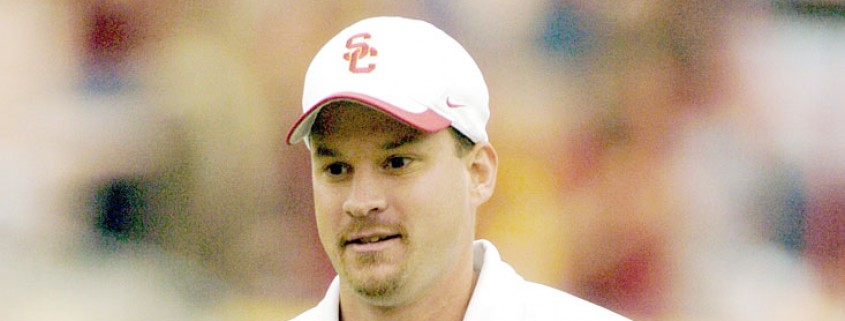NCAA is real felon in McNair case
I’m disgusted and I’m sure much of the rest of the Trojan faithful are as well. Of course, the culprit of this this bad taste in my mouth is once again, the hypocritical institution that is the NCAA.
I don’t even think that ESPN analyst Stephen A. Smith has enough four-syllable words to describe my repugnance for the NCAA’s abhorrent actions and dialogue.
I couldn’t believe some of the things I read while sifting through the hundreds of pages of documents stemming from the 2011 defamation lawsuit brought by former USC assistant coach Todd McNair against the NCAA, which were finally unsealed and made public on Wednesday.
At least now we know the reason why the NCAA had their lawyers fight so hard over the years to prevent all of these confidential emails, memos, interview transcripts and other records from being unsealed.
A couple of my professors, who both happen to be USC alumni, were so appalled that they even brought up the subject matter for discussion in my business law and accounting classes.
The audacity that Shep Cooper, who was simply a liaison to the NCAA’s committee on infractions, had to call McNair a “lying, morally bankrupt criminal” with absolutely no grounds and using that as justification for why he shouldn’t be coaching at any level is absolutely ludicrous.
In a memo to the members of the committee on infractions, Rodney Uphoff, the NCAA’s coordinator of appeals at the time, wrote that the evidence in the case against USC is “markedly stronger than in the Oklahoma City bombing case, which was built entirely on circumstantial evidence.” He even went on to claim that there was no direct evidence that Terry Nichols, who set a Guinness World Record after being convicted of 161 counts of first-degree murder, was ever involved in the bombing plot.
Uphoff also claimed in an email to Roscoe Howard, who sat on the committee, that he had lost sleep because he feared that the committee would be too lenient.
I would lose sleep, too, though if I held the belief that a serial murderer may have been innocent, though not because a prestigious institution was going to possibly get off easy for not controlling its players.
Let’s remember that all of these people mentioned above had no voting power.As seen from their statements above, however, they seemed to have an agenda to make an example out of both the Trojans and McNair.
The two NCAA staffers compared McNair and USC to a convicted felon, and in turn, the school was unfairly treated as if it also were sitting on trial for first-degree murder.
These fallacious conceptions arose from attempts to basically influence the jury, which, at the end of the day, was the committee.
I’m not a legal expert, but it’s my understanding that in a court of law, it is unlawful for any outside source to unduly influence the jury.
Nonetheless, it’s considered an act of misconduct when jurors allow the wishes or beliefs of an outside source to influence their decision-making.
Based on the type of communication in these documents, it’s apparent that this type of misconduct definitely took place leading up to the committee’s final decision.
Los Angeles Superior Court Judge Frederick Shaller echoed this message after ruling in November 2012 that the NCAA was indeed malicious in its investigation of McNair.
I’m not certain about the rules and protocol that the NCAA follows in these investigations, though if something is for certain, it’s that USC was unfairly tried and fell victim to the personal bias of several NCAA employees.
If there’s something we learned on Wednesday, though, it’s that the NCAA has always been the true criminal throughout this whole saga. And thanks to the courts, I’m glad that the rest of the nation is now finally able to see excerpts of this criminal activity in ink.
The tables surely have turned and oh, the irony of it all. The NCAA cited USC for its lack of institutional control, but after reading these documents, it actually seems like it’s the NCAA who needs to be put on a leash.
I’m sure that the USC Office of Athletic Compliance — perhaps the best in the nation at what it does — would gladly offer its assistance, though. At least, we can thank the NCAA for something.
The sanctions are now something in the past, but no one will forget the way the NCAA treated USC throughout this entire process.
The fact that the Trojans’ punishment was handed down almost five years ago and we’re still having these conversations is an exact representation of that.
If anything, McNair should be seen as a USC hero, for if he had never filed his suit in 2011, most of us would have never been exposed to the specific acts of wrongdoing committed by the NCAA.
Though USC and its fans now have some closure regarding everything that took place, I believe that this party is only getting started. Now more than ever, the NCAA’s credibility is being put into question, and it might finally be time for its member institutions to take a stand.
Darian Nourian is a junior majoring in print and digital journalism. He is also the sports editor of the Daily Trojan. His column, “Persian Persuasion,” runs Thursdays.

